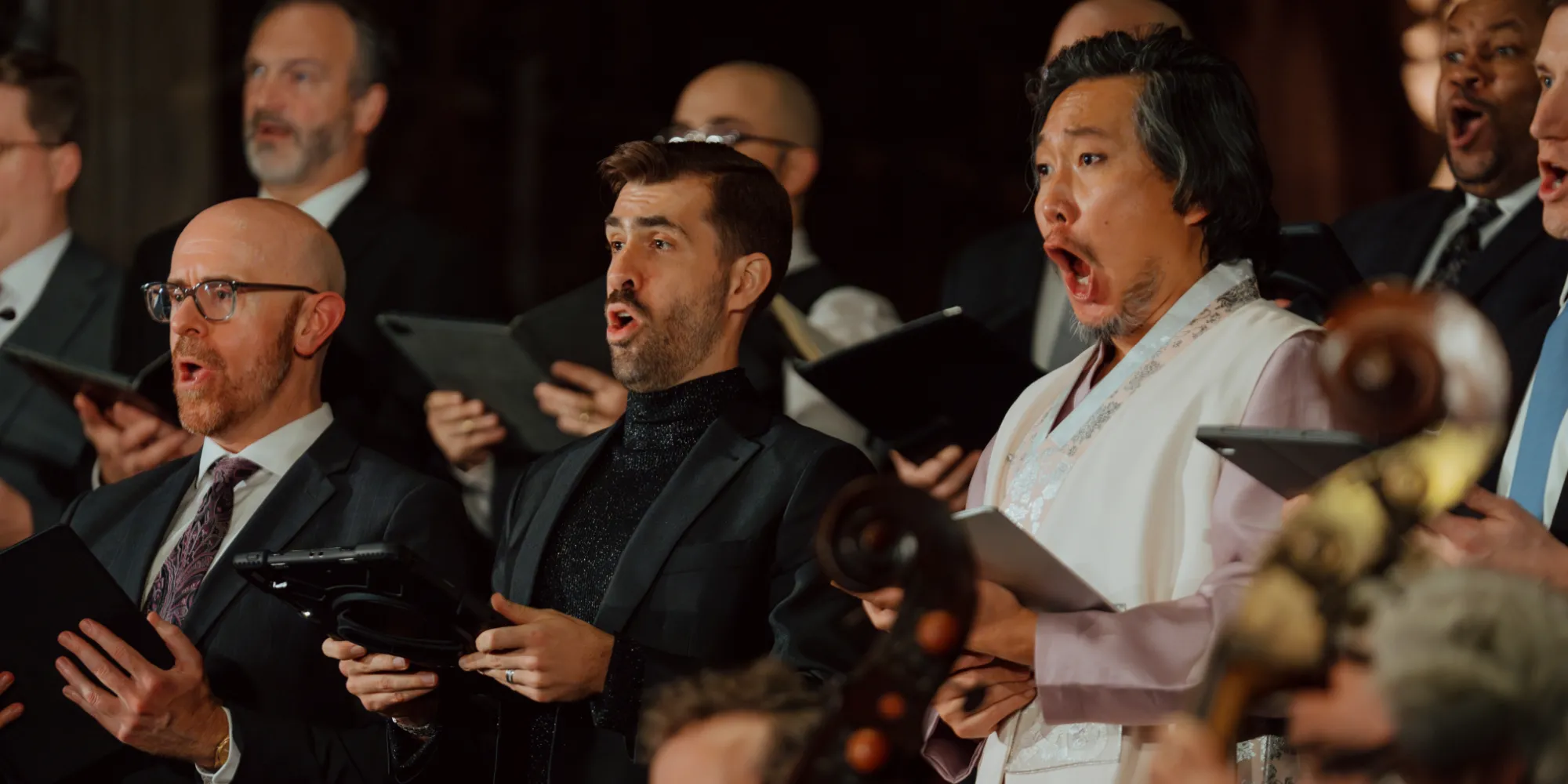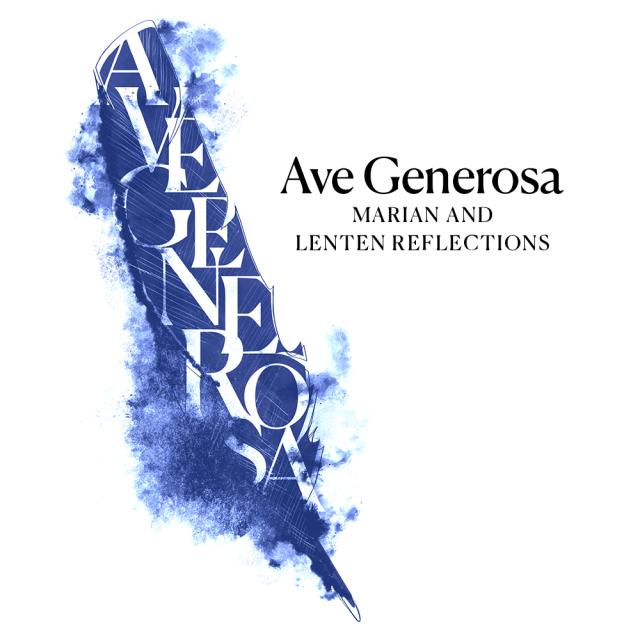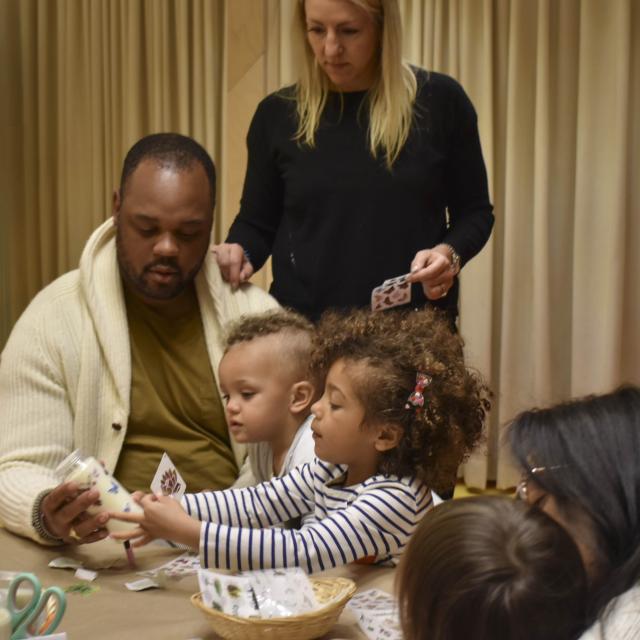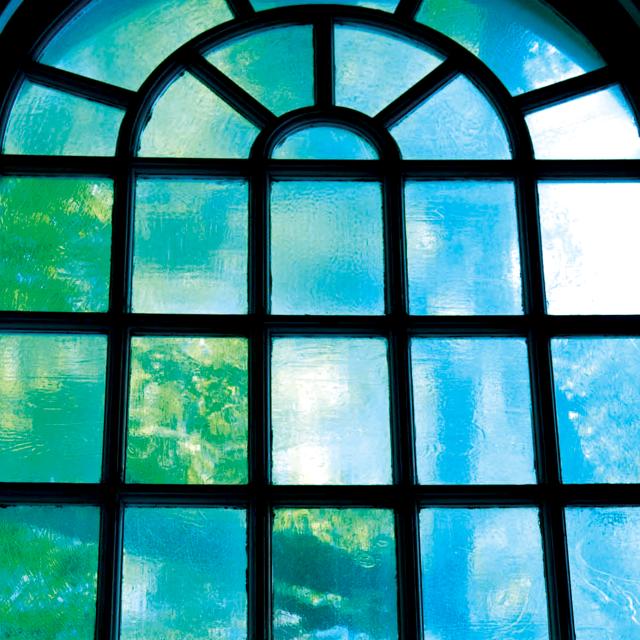Ensembles

Trinity’s innovative music program offers a broad range of expertise, an extensive and growing discography, and a long tradition of championing underrepresented composers.
Trinity Choir
With peerless interpretation of both early and new music, Trinity Choir has redefined the realm of 21st-century vocal music, breaking new ground with artistry described as “blazing with vigour . . . a choir from heaven” (The Times, London). Critics have praised the choir’s performances as “thrilling” (The New Yorker), “musically top-notch” (The Wall Street Journal), and “simply superb” (The New York Times).
The choir was recently featured in several world-premiere oratorios and operas: Paola Prestini’s Silent Light at National Sawdust, Luna Pearl Woolf’s Number Our Days at the Perelman Performing Arts Center, and Benedict Sheehan’s Akathist, which was recorded alongside NOVUS, Downtown Voices, Artefact Ensemble, and Trinity Youth Chorus, and nominated for a 2025 Grammy Award for Best Choral Performance. Other recent highlights: Trinity’s yearly performances of Handel’s Messiah (with soloists from the choir); a production of Craig Hella Johnson’s Considering Matthew Shepard; Shall We Gather at the River, directed by Peter Sellars, and Tyshawn Sorey’s Monochromatic Light (Afterlife), at the Park Avenue Armory; PROTOTYPE Festival’s production of Huang Ruo’s Angel Island; Broken Chord at BAM (created by Gregory Maqoma and Thuthuka Sibisi); a concert in the inaugural Refuge series at the Perelman Performing Arts Center; Handel’s Theodora at Caramoor; Julia Wolfe’s AnthraciteFields; “Notes From Ukraine” at Carnegie Hall; a concert of Bach cantatas at Salle Bourgie in Montreal; and collaborations with the Orchestra of St. Luke’s and the American Modern Opera Company.
Trinity’s longstanding commitment to new music has fostered collaborations with composers including Julia Wolfe, Du Yun, Ellen Reid, Trevor Weston, Mary Kouyoumdjian, Paola Prestini, Luna Pearl Woolf, Ralf Yusuf Gawlick, and Elena Ruehr. Trinity Choir is featured on recordings of three Pulitzer Prize–winning works: Julia Wolfe’s Anthracite Fields, Du Yun’s Angel’s Bone, and Ellen Reid’s p r i s m.
Trinity Baroque Orchestra
Praised for its dramatic vigor and elegantly shaped orchestral sound, Trinity Church’s superb period-instrument ensemble, Trinity Baroque Orchestra, has captivated audiences across North America. The ensemble has appeared in such renowned venues as Lincoln Center’s Alice Tully Hall, the Caramoor Center for Music and the Arts, Berkeley’s Zellerbach Hall, and Montreal’s Salle Bourgie Hall, performing many of the greatest masterpieces of the Baroque repertoire.
A cornerstone of Trinity’s popular Bach at One series, Trinity Baroque Orchestra is widely recognized as one of the country’s most compelling interpreters of Baroque and early music. After presenting Bach’s entire monumental output of sacred vocal music, Trinity Baroque Orchestra and Trinity Choir embarked on The Handel Project, a multiseason initiative presenting Handel’s oratorios. The orchestra is featured annually in Trinity’s critically acclaimed performances of Handel’s Messiah, which The New York Times declared to be “the gold standard.” Recent concert highlights include large-scale performances of Monteverdi’s Vespers of 1610; Handel’s Theodora, Solomon, and Saul; Bach’s St. John and St. Matthew Passions; and appearances throughout the United States and Canada. Trinity Baroque Orchestra can be heard on J. S. Bach: Complete Motets and the Grammy-nominated recording of Handel’s Israel in Egypt, both with Trinity Choir. The orchestra’s distinctive sound is shaped by a roster of North America’s finest period-instrument players — many of whom also serve on the faculties of distinguished institutions such as Yale, Harvard, Indiana University, and The Juilliard School’s Historical Performance Program.
NOVUS
Trinity Church’s groundbreaking new-music ensemble, NOVUS, is a vital force in the contemporary music scene. These “expert and versatile musicians” (The New Yorker) perform music from all corners of the repertoire, meeting “every challenge with an impressive combination of discipline and imagination” (New York Classical Review).
Renowned for its innovative programming, NOVUS challenges audiences to engage with urgent social issues. In 2023, NOVUS launched its Renewal series focused on prison reform and climate change. Last season’s Renewal: Shelter explored the challenges of being unhoused in America and included the New York premiere of Gabriel Kahane’s compelling work emergency shelter intake form. This season, Renewal: Undivided features the world premiere of Andrew Yee’s Trans Requiem, a bold new work commissioned by Trinity Church that centers on trans voices and experiences.
At the PROTOTYPE Festival, NOVUS and Trinity Church have partnered with Beth Morrison Projects in the development of several major new works. These include Emma O’Halloran’s opera pairing Trade/Mary Motorhead; two Pulitzer Prize–winning works: Ellen Reid’s p r i s m (2019) and Du Yun’s Angel’s Bone (2017); Missy Mazzoli and Royce Vavrek’s Breaking the Waves; the East Coast premiere of Reid’s Dreams of the New World; and the world premiere of David T. Little’s revised version of Am I Born, which was recorded with NOVUS and Trinity Choir.
NOVUS has forged strong links with many of today’s leading composers. The ensemble was recently featured in several world-premiere oratorios and operas: Paola Prestini’s Silent Light at National Sawdust, Luna Pearl Woolf’s Number Our Days at the Perelman Performing Arts Center, and Benedict Sheehan’s Akathist, which was nominated for a 2025 Grammy Award. The ensemble’s recordings include Benedict Sheehan’s Akathist and LUNA PEARL WOOLF: Fire and Flood, which were both nominated for a Grammy; Prestini’s The Hubble Cantata; Du Yun’s Angel’s Bone; Trevor Weston’s Choral Works; Elena Ruehr’s Averno; Edward Thomas’s opera Anna Christie; Ellen Reid’s p r i s m; and Philip Glass: Symphony No. 5.
Downtown Voices
Praised by The New York Times for its “incisive, agile strength,” Downtown Voices is a Grammy-nominated, semiprofessional choir conducted by Stephen Sands. Now celebrating its 10th anniversary season, the ensemble was founded as a high-level chorus committed to performing great choral works across genres, eras, and traditions.
Downtown Voices has premiered several major new works, including Stephen Main’s The Image at Trinity Church; Reena Esmail’s Malhaar: A Requiem for Water at St. Paul’s Chapel; Luna Pearl Woolf’s Number Our Days at the Perelman Performing Arts Center; Zachary Wadsworth’s Spire and Shadow at St. Paul’s Chapel; and Benedict Sheehan’s Akathist, an expansive oratorio recorded with Trinity Choir, Artefact Ensemble, Trinity Youth Chorus, and NOVUS. Akathist was nominated for the 2025 Grammy Award for Best Choral Performance.
In 2022, the choir made its Carnegie Hall debut with the Buffalo Philharmonic, conducted by JoAnn Falletta in the Lukas Foss Centennial Celebration. At Trinity Church, the choir has performed at Compline by Candlelight and headlined numerous marquee concerts. Downtown Voices has been featured with Andrea Bocelli and can be heard on the epic recording Philip Glass: Symphony No. 5, released by Orange Mountain Music, as well as Benedict Sheehan’s Akathist on the Bright Shiny Things label.
Trinity Youth Chorus
Now in its 21st season, Trinity Youth Chorus brings together talented young people ages 5 to 18 from the five boroughs of New York City. Choristers receive individual and group training in vocal technique, music theory, sight-reading, and performance skills from Trinity’s music education team.
This Grammy-nominated ensemble provides musical leadership for various worship services and offer concerts throughout the season, often performing with Trinity’s professional ensembles, including Trinity Choir, NOVUS, and Trinity Baroque Orchestra. In 2023–24, Trinity Youth Chorus was featured in two world-premiere performances: Luna Pearl Woolf’s Number Our Days at the Perelman Performing Arts Center and Benedict Sheehan’s oratorio Akathist, which was recorded alongside Trinity Choir, Artefact Ensemble, Downtown Voices, and NOVUS, and nominated for a 2025 Grammy Award for Best Choral Performance. Recent highlights include a main-stage performance for the Perelman Performing Arts Center’s Refuge series, Kim André Arnesen’s Tuvayhun, Carl Orff’s Carmina Burana, Leonard Bernstein’s Chichester Psalms, a fully staged production of Benjamin Britten’s Noye’s Fludde, Ellen Reid’s Winter’s Child at the PROTOTYPE Festival, Alberto Ginastera’s Turbae ad Passionem Gregorianam and Gustav Mahler’s Symphony No. 8 at Carnegie Hall, and Benjamin Britten’s War Requiem with the Queens College Choral Society. Recording projects include Benedict Sheehan’s Akathist, Philip Glass: Symphony No. 5, and Lisa Bielawa’s My Outstretched Hand with the San Francisco Girls Chorus and The Knights.
Trinity Youth Chorus is featured in the films Love Is Strange and Doubt, as well as in Bielawa’s made-for-TV opera, Vireo; has sung backup for Josh Groban, the Rolling Stones, and Bobby McFerrin; and has been heard on Public Radio International and CBS’s The Early Show.
St. Paul’s Chapel Choir
St. Paul’s Chapel Choir brings together people who love to sing and are drawn to the joy and connection of a warm and welcoming musical community. This volunteer ensemble of sopranos, altos, tenors, and basses, led by Thomas McCargar, a longtime member of Trinity’s renowned music program, provides opportunities for singers of all backgrounds to deepen their musicianship through weekly rehearsals and participation in monthly services at Trinity Church.
The choir performs a broad range of sacred choral repertoire, from beloved Anglican anthems to contemporary compositions. The Trinity Choral Scholars sing as a part of the Chapel Choir, and on Sundays the ensemble joins with Trinity Choir, enriching both its musical experience and shared sense of liturgical purpose. Besides offering musical excellence, St. Paul’s Chapel Choir fosters a powerful sense of belonging through song.






